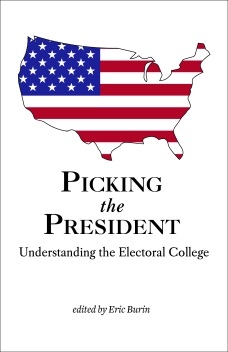 Download the free book here (pdf) | Buy it here ($8)
Download the free book here (pdf) | Buy it here ($8)
Eric Burin, editor. Picking the President: Understanding the Electoral College. Grand Forks, ND: The Digital Press at the University of North Dakota, 2017.
https://doi.org/10.31356/dpb002
The 2016 presidential election has sparked an unprecedented interest in the Electoral College. In response to Donald Trump winning the presidency despite losing the popular vote, numerous individuals have weighed in with letters-to-the-editor, op-eds, blog posts, videos, and the like, and thanks to the revolution in digital communications, these items have reached an exceptionally wide audience. In short, never before have so many people had so much to say about the Electoral College.
To facilitate and expand the conversation, Picking the President: Understanding the Electoral College offers brief essays that examine the Electoral College from different disciplinary perspectives, including philosophy, mathematics, political science, history, and pedagogy. Along the way, the essays address a variety of questions about the Electoral College: Why was it created? How has it changed over time? Who benefits from it? Is it just? How will future demographic patterns affect it? Should we alter or abolish the Electoral College, and if so, what should replace it? In exploring these matters, Picking the President enhances our understanding of one of America’s most high-profile, momentous issues.
With contributions by Eric Burin, Brad Austin, Bill Caraher, Allen C. Guelzo and James H. Hulme, Mark Stephen Jendrysik, Donald F. Johnson, Benjamin J. Kassow, Andrew Meyer, Cynthia Culver Prescott, Timothy Prescott, Patrick Rael, Andrew Shankman, Manisha Sinha, Mark Trahant, and Jack Russell Weinstein.
Download the book here (pdf) | Buy it here ($8)
Table of Contents
Introduction: A Brief History of the Electoral College
Eric Burin
Download
Section One: The Electoral College in Comparative Perspective
Ancient States and Representative Government:
Greek and Roman Models for the Electoral College
William Caraher
Download | Comment
The Electoral College as American Aristocracy
Donald F. Johnson
Download
America’s Rotten Electoral College System
Manisha Sinha
Download
The South (or the North, or the West…) Will Rise Again, and Again, and Again:
Viewing the Electoral College from the Perspective of Chinese History
Andrew Meyer
Download
Section Two: The Electoral College in Historical Perspective
What the Founders Were Thinking: Why We have the Electoral College
Andrew Shankman
Download
Did Disenfranchisement Give the South an Electoral Advantage?
Patrick Rael
Download
Citizenship, Civil Rights, and Electoral Politics
Cynthia Culver Prescott
Download
Quantifying a Candidate’s Advantage in the Electoral College
Timothy Prescott
Download
Section Three: The Future of the Electoral College
If the Electoral College Can Contradict the Popular Vote Sometimes, Why Would It Be
Wrong for Them To Do It Every Single Time?
Jack Russell Weinstein
Download
Electoral College is Fixable; Senate is Not.
Mark Trahant
Download
Long Habits and Legitimacy
Mark Stephen Jendrysik
Download
In Defense of the Electoral College
Allen Guelzo and James H. Hulme
Download
Electoral College Alternatives: Tradeoffs
Benjamin J. Kassow
Download
Section Four: Teaching the Electoral College
“Empathy for the Unicorn”:
Teaching About the Electoral College
Brad Austin
Download
Documents
Download
The Constitutional Convention
U.S. Constitution: Article II
Federalist Paper No. 68
Anti-Federalist Paper No. 68
Anti-Federalist Paper No. 72
Amendment 12
Timothy Pickering, Speech in Favor of the Twelfth Amendment
James Madison to George Hay
James Madison to John Hillhouse